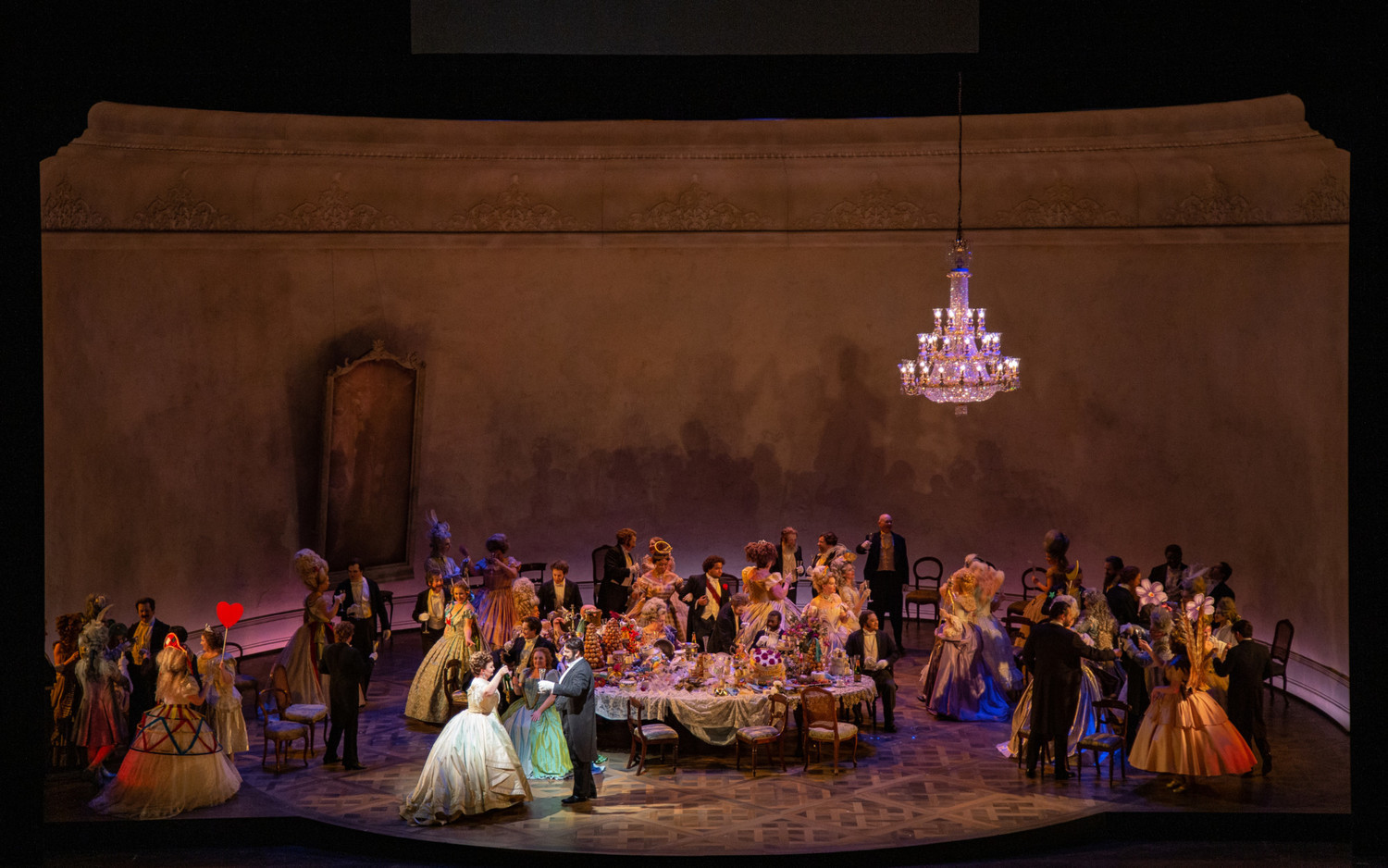Review: LA TRAVIATA at Lyric Opera Of Chicago

As with most tales of doomed romance, Giuseppe Verdi's LA TRAVIATA highlights the contrasts between two social spheres and the difficulties faced by lovers who try to bridge this chasm. In this 1853 opera, based on a play by Alexandre Dumas, fils, the beautiful courtesan Violetta Valéry (Albina Shagimuratova) tries to escape her past life among the hedonistic upper classes of Paris to settle down with her true love, Alfredo Germont (Giorgio Berrugi). After a brief period of bliss, the couple is driven apart by the strict bourgeois morality of Alfredo's family, in particular his father, who refuses to overlook Violetta's shameful past until she is on her deathbed.
In Lyric Opera of Chicago's staging*, director Arin Arbus crafts starkly different visual worlds to illustrate decadent 19th century Paris, the idyllic countryside to which Violetta and Alfredo escape, and, finally, the loneliness and poverty of our heroine's final hours. Deftly wielding light and shadow, warm and cool hues, and cleverly devised costumes and sets, Arbus and her design team create images that prove every bit as memorable as the performances by the production's international stars.
As conductor Michael Christie leads the Lyric Opera Orchestra through the poignant prelude, we glimpse Violetta and her faithful maid Annina (Lauren Decker) through a transparent blue damask curtain. Still weak from a recent illness, Violetta dons a large ball gown in front of her bedroom mirror. Despite the foreboding undertone caused by her poor health, all is quiet and tranquil in this intimate vignette.
Then, an enchanting scene change: the soothing prelude gives way to the upbeat opening number, and the lights go up to reveal a party already in progress upstage. Cait O'Connor's lavish pastel costumes and wigmaster Sarah Hatten's extravagant up-dos are lit from below by Marcus Doshi, causing the partygoers' shadows to dance along the tall beige wall that forms the backdrop of Riccardo Hernandez's set. Shadows become a recurring element used to various effects throughout this production. Here, they seem to indicate the fleeting nature of the worldly pleasures for which Violetta lives.
Five months later, Act II brings another drastic transition; Violetta has abandoned her former pursuits and is devoted to her newfound love, Alfredo. Their country domicile is a picture of 19th century domesticity, with a Romantic landscape as a backdrop to the couple's simple yet elegant furnishings. This peaceful arrangement is threatened when Alfredo's father, Giorgio Germont (Zeljko Lucic**), arrives on the scene. Insisting that her former career as a courtesan taints the entire family, Giorgio convinces Violetta to leave Alfredo for his own good. To end Act II, we are whisked away to another party, entirely different from the first. Red infuses everything-the damask walls, the paper lanterns, the severe lighting, the ominous shadows, and the Spanish-inspired costumes-to create a menacing tone for Alfredo's public denunciation of Violetta.
Finally, we find ourselves back in Violetta's sparsely furnished, blue-toned bedroom, having come full circle in this vivid visual parade. As Violetta lies dying, the outside world continues its revelry. Shadows are employed again, this time to depict the outlandish figures of Carnival celebrations, highlighting the fact that Violetta has been forgotten by Parisian society as well as deserted by Alfredo. Though Alfredo and his father return and beg her forgiveness, it is too late for our tragic lovers.
A stellar cast of singers inhabits these characters, led by Russian soprano Albina Shagimuratova as Violetta. Though her timing seemed shaky in several moments on opening night, her command of dynamics in all registers makes for a sensitive interpretation of Violetta's arias and duets. Italian tenor Giorgio Berrugi gives a standout performance as Alfredo in his Lyric debut. His lyrical phrasing and impeccable timing hint that his background as a professional clarinetist has served him well in the transition to a vocal career. As Alfredo's father, Giorgio Germont, Zeljko Lucic** provides a strong foil to Shagimuratova in their confrontation scene. Zoie Reams makes a memorable Flora, friend of Violetta; though her solos are few, the mezzo-soprano's rich tone leaves one wishing to hear more. Along with the tight ensemble of the Lyric Opera Chorus and Orchestra, the principals deliver an immensely satisfying evening of Verdi's music.
Stunning designs, great music, dramatic romance and tragedy... LA TRAVIATA has the best of all things opera. In my opinion, the visual storytelling by Arin Arbus and her creative team is the most impressive element of this production. Photos simply cannot do it justice. This treat for the eyes (and, of course, for the ears) must be experienced in person.
LA TRAVIATA plays through March 22 at Lyric Opera of Chicago, 20 N. Wacker Drive, Chicago, IL 60606. Tickets are available at 312.827.5600 or lyricopera.org.
Review by Emily McClanathan
*Coproduction of Lyric Opera of Chicago, Houston Grand Opera, and Canadian Opera Company
**See Lyric Opera's website for correct diacritical marks in performer's name
Photo courtesy of Lyric Opera of Chicago
Videos
